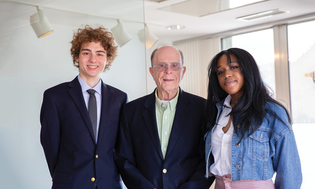
The Community Foundation for Greater New Haven/Judy Sirota Rosenthal
Sam Chauncey ’57, with two Class of 2024 students. Every year, two students will be chosen for a year of artistry or community service in honor of Sam.
View full image
There are people who simply give up, and there are people who keep carefully urging, pressing, and pushing to create something better. They’re a hard-working group. My conviction is that Henry Chauncey, Jr. ’57—Sam, as he’s been called since he was a child—is one of the hardest-working, never-say-die humans in the United States.
For those who don’t know him: Sam is the descendent of an ancient family of Norman nobles, who sailed from France in 1066 to conquer England. In his book Recollections and Reflections on Yale, he notes that at some point, the Chauncey family lost their nobility and turned to the ministry. And sometime in 1637, when Protestantism was the approved form of worship in England, a Chauncey who had been jailed because he was a Puritan got on a ship and fled to the Massachusetts Bay Colony. It turned out well: about seven years after he reached Massachusetts, he ended up leading Harvard College.
Fast-forward to the days of Sam’s grandfather and father, who were far from wealthy but very smart. They both went to Harvard, thanks to those who had noticed their abilities. After Sam’s father graduated, he started working in admissions at Harvard. But Sam chose Yale. He felt “a sense of wanting to do my own thing.”
He was on scholarship. As a freshman, he got up before 6:00 a.m. and worked for two hours in the dining halls. Later on, he took notes for a political science professor, and later still, he found a job in the athletics department. As a senior, he became the dean of his class, which allowed him to spend time with many of Yale’s greats. To name a few: Maynard Mack ’36PhD, Chauncey Brewster Tinker ’99, ’02PhD, and George Pierson ’26, ’33PhD. Moreover, the CIA tried to recruit him, but “life in a university seemed less dangerous.”
After graduating, Sam became an assistant dean and part of the administration. He worked for President Whit Griswold ’29, ’33PhD, and later as special assistant to President Kingman Brewster Jr. ’41. His responsibilities “were to run the Office of the President, to represent the president in certain ways, and most importantly to help make the presidency work.” In 1972 he was made Secretary of the University.
Possibly the most exasperating work was bringing the university around to coeducation. The bulk of US universities had already admitted women, but Yale was ridiculously behind the times. In a Q&A I had with Sam about five years ago, he said the dean of undergraduate admissions, Arthur Howe ’43, told the New York Times in 1956 that he thought women should be accepted at Yale. Right away, President Griswold called Howe into his office and said, “I want to say two things.
One is that I think you’re right; we should have women at Yale. The other is, don’t ever say it again publicly.”
Sam and the late Elga Wasserman ’76JD started coeducation up in 1969. It wasn’t altogether pleasant; many faculty men couldn’t bear to teach women. One history professor told his class, “I’ll lecture for 35 minutes, then we’ll have discussion, and then I’m saving five minutes for the women’s point of view.”
Sam is an indefatigable doer. He left Yale in order to start Science Park. Next, he took over the presidency of Gaylord Hospital in Wallingford. After that, he came back to Yale to assist with the health management program at the School of Public Health.
Recently, Sam received a major accolade: the establishment of the Chauncey Fellowship. It’s a bequest from the remarkable Edward (“Edder”) Bennett III ’84, who died at 57 and is very deeply missed. The Fellowship will be bestowed every year on two Yale students who will use the funds for one year of artistry or community service.
The initial awards will go to Jonathan Weiss ’24, a composer, who helps people with disabilities to manage their stress and pain through music; and to Samantha Sims ’24, a New Haven Promise scholar who will invite Black people of the African diaspora to share traditional meals, and to remember their roots.
And Sam: what I’ve written about here must be one percent of the work you’ve done over the years. Let’s get together for coffee, and you can tell me more.
 loading
loading